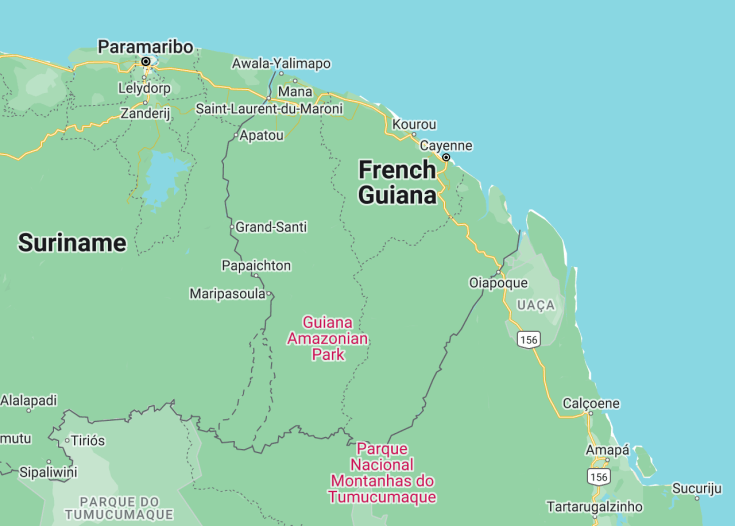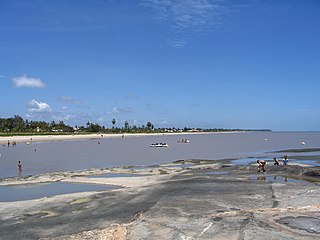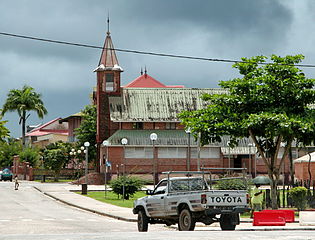French Guiana, an overseas department and region of France, offers a unique blend of tropical landscapes, cultural diversity, and adventure. From exploring the stunning rainforests of Amazonian proportions to experiencing the rich heritage of indigenous cultures, French Guiana promises an unforgettable getaway. Discover the vibrant capital city of Cayenne, where colonial architecture meets local markets bursting with exotic spices and crafts.
Immerse yourself in the stunning rainforests of French Guiana and experience the vibrant culture of its capital city, Cayenne.
Embark on an adventure in the heart of the Amazon rainforest and discover the intriguing history of French Guiana’s penal colonies on Devil’s Island.
Top destinations in French Guiana (France)
French Guiana: Gateway to Amazonian Wonders.
| Capital | Cayenne |
| Time in French Guiana | GMT-3 |
| Language spoken | French |
| Population | Approximately 290,000 (source: INSEE 2021) |
| Religion | Christianity (primarily Roman Catholic (85%) Other religions and non-religious (15%) |
| Currency | Euro (€, EUR) |
| Airports | Cayenne – Félix Eboué Airport |
French Guiana, often described as a verdant gem, stands as an intriguing fusion of South American pulse and French sophistication. Nestled in the northeastern corner of South America, this French overseas department is a beguiling blend of rainforests, colonial architecture, and multicultural cities. Historically, it was prized by colonial powers for its geostrategic location and its potential agricultural value. The indigenous peoples, followed by waves of settlers, slaves, and immigrants, have contributed to the rich cultural tapestry that is palpably present today. Its space center, which is a cornerstone of European space endeavors, symbolizes the juxtaposition of advanced modernity amidst untouched natural beauty.
Where is French Guiana located?
French Guiana is situated between Brazil to the south and east, Suriname to the west, and the Atlantic Ocean to the north. It is the only territory in mainland South America that is still part of a European country.
What is French Guiana famous for?
French Guiana is famous for its diverse natural landscapes and its association with space exploration. It is home to the Guiana Space Centre, a major European spaceport where satellites are launched into orbit. The region’s untouched rainforests, including parts of the Amazon Rainforest, provide a haven for biodiversity and ecotourism. French Guiana is also known for its rich cultural heritage, with influences from indigenous communities, African traditions, and French colonial history.
History
Pre-Colonial Era: Indigenous Settlements
Long before European explorers set foot on its shores, French Guiana was home to numerous indigenous tribes. The Arawaks and Caribs were among the earliest known inhabitants, relying on the land’s bounty, from the dense rainforests to the rich rivers, for sustenance and shelter.
1498-17th Century: European Exploration and Early Colonization
The first European to encounter French Guiana was Christopher Columbus in 1498, but it wasn’t until the late 16th century that the French made their initial attempts at colonization. These efforts faced challenges from both the indigenous population and rival European powers. Early settlements were precarious and frequently met with hardships.
18th Century: Establishment of Colonial Rule
The 18th century saw the firm establishment of French control over the territory. Despite facing competition from the British and the Dutch, the French successfully secured their claims to the land, and French Guiana became an official French colony in 1763. The territory was exploited for its resources, notably sugar and coffee, cultivated on plantations using enslaved Africans.
19th Century: From Slavery to Penal Colony
The abolition of slavery in 1848 was a turning point for French Guiana. However, its legacy marked a new era of suffering. In 1852, the French government transformed the territory into a penal colony, leading to the establishment of the infamous Îles du Salut, which includes Devil’s Island. Over the course of almost a century, thousands of prisoners, including political prisoners like Captain Alfred Dreyfus, were sent to endure the harsh conditions.
20th Century: Decolonization and Development
The horrors of the penal colony system ended in 1946 when French Guiana became an overseas department of France. With this new status, there was an influx of investment and development into the region. Infrastructure was developed, health and education systems were improved, and there was a move towards modernization. In 1964, the Guiana Space Centre was established, turning the region into a pivotal location for European space exploration.
21st Century: Contemporary French Guiana
Today, French Guiana remains an integral part of the French Republic, benefiting from the political and economic structures of mainland France. While the space center continues to play a significant role in its economy, French Guiana faces challenges in terms of social disparities and calls for greater autonomy. The territory’s rich multicultural heritage, a blend of indigenous, African, Asian, and European influences, makes it a unique and vibrant part of the Americas.
Visit French Guiana (France)
What to see and do in French Guiana
French Guiana offers a range of unique attractions and experiences for visitors to explore. Here are some highlights:
- Visit the Îles du Salut, including Devil’s Island, to learn about the history of the penal colonies and explore the ruins
- Explore the Amazon rainforest, which covers a significant portion of the region, and discover its diverse flora and fauna
- Take a boat tour along the Maroni River and learn about the culture and traditions of the Maroon communities
- Visit the European Spaceport in Kourou and witness a rocket launch
- Experience the vibrant local culture and cuisine in the capital city of Cayenne
Short tile about events in French Guiana
French Guiana hosts various events throughout the year, offering visitors a glimpse into its vibrant culture and traditions. The most notable event is the Carnaval de Guyane, held in February, which showcases colorful parades, music, dance, and traditional costumes.
Another significant event is the Fête de l’Indépendance, celebrated on July 10th, commemorating the abolition of slavery in French Guiana.
Best time to visit French Guiana
The best time to visit French Guiana is during the dry season, which generally lasts from June to November. This period offers more favorable weather conditions for outdoor activities and exploration of the rainforest. However, it is important to note that French Guiana has a tropical climate with high humidity, so visitors should be prepared for potential rain showers throughout the year.
Is French Guiana worth visiting?
French Guiana is definitely worth visiting for those who have an interest in exploring unique cultures, diverse ecosystems, and witnessing the wonders of space exploration. The region has a rich history, showcasing both the dark period of penal colonies and the resilience of its indigenous communities.
However, it is important for potential visitors to be aware of the challenges and limitations that come with visiting a remote overseas department. French Guiana may not offer the same level of tourist infrastructure as more popular destinations, and travelers should be prepared for the unique experiences and potential language barriers that may arise.
Overall, if you are seeking an off-the-beaten-path adventure and are fascinated by the intersection of history, culture, and nature, French Guiana can provide a rewarding and unforgettable experience.
Common questions
What are the main attractions in French Guiana?
- The Guiana Space Centre – A world-renowned spaceport where you can witness rocket launches.
- The Amazon Rainforest – Home to diverse flora and fauna, you can go on guided tours or hikes to explore this natural wonder.
- The Îles du Salut – These islands were once used as penal colonies and now serve as a historical site and tourist attraction.
- The Maroni River – A picturesque river that forms the border between French Guiana and Suriname, offering opportunities for boat tours and wildlife spotting.
- The Tumuc-Humac Mountains – Perfect for adventurers and nature lovers, these mountains offer breathtaking views and hiking trails.
What is the best time to visit French Guiana?
What is the local cuisine in French Guiana?
- Acarajé – A popular Afro-Brazilian street food made from deep-fried black-eyed pea dough filled with shrimp and served with spicy sauce.
- Couac – A traditional Amerindian dish made from cassava flour and often served with fish or meat.
- Colombo de Poulet – A flavorful chicken curry dish infused with Indian spices.
- Piranha Soup – A unique soup made from piranha fish, often prepared with vegetables and herbs.
What activities can I do in French Guiana?
- Exploring the Amazon Rainforest through guided hikes or boat tours.
- Visiting the historic Îles du Salut and learning about their role as former penal colonies.
- Attending a rocket launch at the Guiana Space Centre.
- Discovering the rich biodiversity of the region through wildlife spotting.
- Embarking on a river cruise along the Maroni River.
What is the transportation system like in French Guiana?
- Taxis – Readily available in major towns and cities, taxis are a convenient way to get around.
- Rental Cars – Renting a car provides flexibility and allows you to explore the region at your own pace.
- Public Buses – Bus services operate on predefined routes and are an affordable option for traveling between cities.
- Boat Tours – If you wish to explore the rivers and waterways, boat tours are available.
What are some cultural festivals celebrated in French Guiana?
- Carnival – Celebrated in February or March, Carnival features vibrant parades, music, dancing, and colorful costumes.
- Amerindian Heritage Festival – Held in September, this festival showcases the rich Amerindian traditions, dances, and crafts.
- Chinese Spring Festival – Celebrated by the local Chinese community, this festival features dragon and lion dances, firecrackers, and traditional food.
- Pentecost Holidays – This religious festival is celebrated by the indigenous population with traditional dances and cultural events.
Are there any precautions I should take while visiting French Guiana?
- Apply insect repellent to protect against mosquito-borne diseases.
- Take precautions against sun exposure, such as wearing sunscreen and a hat.
- Respect the local customs and traditions of the communities you visit.
- Be aware of your surroundings, especially in urban areas, and take necessary precautions to avoid theft and pickpocketing.
Can I visit the Guiana Space Centre as a tourist?
Where can I go wildlife spotting in French Guiana?
- The Amazon Rainforest – Take guided tours or hikes with experienced guides who can help you spot a variety of animals.
- The Tumuc-Humac Mountains – Explore the mountainous region for a chance to see unique bird species and other wildlife.
- The Maroni River – Join boat tours along the river, where you can spot caimans, water birds, and other aquatic life.













